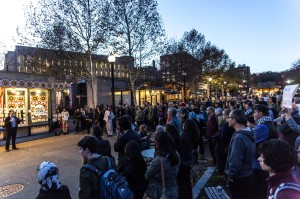
On November 7 the Pittsburgh-based Conflict Kitchen posted on their Facebook page that they received a letter containing death threats and would close temporarily until the credibility of the threat could be verified by police. This is just the latest incident in a pattern of growing hostility towards the take-out kiosk since they began serving cuisine from Palestine in early October.
Conflict Kitchen is a restaurant and art project created by Carnegie-Mellon University professor Jon Rubin and artist Dawn Weleski. The restaurant serves cuisine exclusively from countries facing hostility from U.S. imperialism in order to “expand the engagement the public has with the culture, politics, and issues at stake within the focus region.” The cuisine is often supplemented with public events, performances, and discussions. Past iterations have focused on Afghanistan, Cuba, North Korea, Iran, and Venezuela.
Zionists distort and attack Conflict Kitchen
Almost immediately, Pittsburgh Zionists began a campaign to demonize and isolate Conflict Kitchen in response to its Palestinian focus. The Palestinian iteration was kicked off with a discussion co-hosted with the University Honors College at University of Pittsburgh. Zionists decried the event as “one-sided” and “anti-Israel” because they were not given a space on the panel to express their views.
Local mainstream media carried this claim to press. The Pittsburgh Post-Gazette ran an article originally headlined “Conflict Kitchen’s Palestinian dishes leave bitter taste.” Public pressure from attendees, many of whom wrote letters to the editor defending the event as balanced and criticizing the Post-Gazette’s bias, forced them to change the title of the article to “Conflict Kitchen’s Palestinian focus criticized as one-sided.” Hadeel Salameh, president of University of Pittsburgh Students for Justice in Palestine, wrote “It’s disappointing that the amount of respect for differing views and actual conversation that took place at the event were lost in the article.” However, the controversy stirred by Zionists caused the University Honors College to officially withdraw its sponsorship of Conflict Kitchen.
Zionist lobbying group B’nai B’rith International then began a campaign distort the restaurant’s food wrappers, claiming the restaurant was “bundling anti-Israel propaganda with food from ‘Palestine’ [sic].” B’nai B’rith used the wrappers as ammunition to put pressure on The Heinz Endowments. The foundation, which is chaired by Secretary of State John Kerry’s wife Theresa Heinz Kerry, gave Conflict Kitchen a $50,000 grant in order to relocate from East Liberty to its present Oakland location in 2013. B’nai B’rith called on the Heinz Endowments to publicly disavow the restaurant, and the controversy reached national and international media outlets. The Heinz Endowments President Grant Oliphant released a statement soon afterwards, writing, “I want to be especially clear that its current program on Palestine was not funded by the endowments and we would not fund such a program, precisely because it appears to be terribly at odds with the mission of promoting understanding.”
“Read the actual wrapper”
Conflict Kitchen defended itself against the Heinz Endowments’ capitulation to Zionist pressure in a statement released on their website on November 6. In response to the accusation that they are not promoting understanding, Conflict Kitchen wrote, “Promoting understanding is at the core of Conflict Kitchen’s mission. We have demonstrated this in the past by presenting the food, culture, and viewpoints of Iranians, Afghans, Cubans, North Koreans, and Venezuelans. We believe that presenting the viewpoints of Palestinians promotes understanding of Palestinians.”
Conflict Kitchen also called out the hypocrisy of the Heinz Endowments, citing Oliphant’s statement in a recent Post-Gazette article: “There is another major issue at stake here concerning the rights of arts organizations to perform edgy and provocative programming…. That, in many
ways, is the role of the arts, and while we may not always agree with the positions and opinions they express, we do support their right to express them.” Conflict Kitchen responded by saying, “The Heinz Endowments cannot have it both ways.”
Conflict Kitchen wrote, “The grant made to us was, as stated in the grant agreement, ‘To support Conflict Kitchen’s new programming and development at its new location in Schenley Plaza.'”
On November 8, the restaurant released another statement countering the right-wing Zionist distortion of their food wrappers: “The Post Gazette’s (and other media and lobbying groups‘) insistence on continually misrepresenting our food wrappers as ‘anti-Israeli messages,’ shows a distinct lack of research into what is actually on the wrappers, a reinforcement of right-wing accusations made in other media, and thoughtlessness about our current situation. Like we have done for four years with every other country of focus, our food wrappers contain the viewpoints of multiple people within our focus country on a wide variety of topics. Our Palestinian interviews are no different, they contain interviews on food, culture, the Palestinian Authority, settlements, dating, resistance olive trees, Nakba, movement and travel, and food customs. The interviews were done by us personally with Palestinians in Palestine, and in our own city. The thoughts and opinions that come through the interviews are informed by their personal context, experiences and
histories as Palestinians. Perhaps it is hard for some people to hear that Palestinians are not happy with Israeli policies or the actions of some of its citizens, but to cast their viewpoints as simply anti-Israel is to reinforce the simplest, most polarizing, and dehumanizing reading of their lives and perpetuate the silencing of their voices. We say read the ACTUAL wrapper, the whole thing.”
One of the interviews connected the brutal military occupation of Palestine to the Pittsburgh region: “At one protest, Israeli soldiers aimed tear gas canisters directly at protesters only a few meters away. When they shot our friend Bassim, it made a big hole in his chest and killed him. The canister was made in Western Pennsylvania; you can see that printed on the side.” This same company also made weaponry that was used against protesters in Egypt and Turkey during their uprisings in 2011 and 2013 respectively.
Community stands with Conflict Kitchen
In the wake of the death threats and subsequent closing, the Palestinian community and its allies quickly organized to stand in solidarity with Conflict Kitchen. Pitt SJP called for daily sit-ins outside the kiosk; the first day brought over 200 people to the restaurant who taped notes of support all over the front facade of the restaurant. After the threat was cleared, Conflict Kitchen reopened on November 12 to massive lines.
The Palestinian iteration has been the restaurant’s most popular to date with 300-400 customers a day. “Our customers have been incredibly interested in our food and the Palestinian viewpoints expressed in our printed materials and events, responding with sincere and thoughtful questions,” Conflict Kitchen wrote on their website. In spite of the Zionists’ claim that presenting the viewpoints or increasing the visibility of Palestinians is “anti-Israel” and “one-sided,” the Pittsburgh community values Conflict Kitchen’s mission of giving voice to peoples demonized and oppressed by imperialists and the delicious food it serves.






